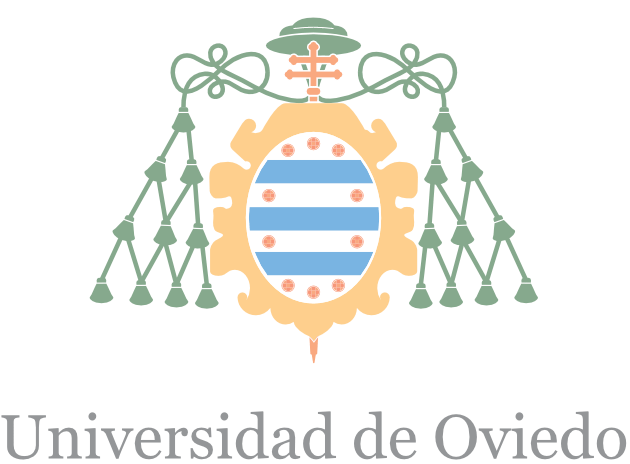
Universidad de Oviedo
The University of Oviedo is a Spanish public university, founded posthumously in 1608 by Archbishop Fernando Valdés Salas. Since its origins, it stood out in terms of quality as one of the main higher education centers in the country. It currently has seven campuses located in three different cities in the region (Oviedo, Gijón and Mieres) with a total of 19,000 students, both national and international, and a team of approximately 2,100 researchers and teachers. The university offers 60 different degree studies, all of them adapted to the European Higher Education Area (EHEA), but also bilingual itineraries, double degrees with international universities, and Erasmus Mundus and interuniversity master’s degrees. Additionally, University of Oviedo carries out numerous teaching collaboration tasks with more than 250 companies, both within Spain and outside our borders. Thus, since 1997 it has been one of the founding members of the Group 9 of Spanish Universities (G9), characterized by being made up only of universities that are the only ones in their autonomous community, and that each year offers different diverse training courses through a shared virtual campus. It also collaborates with the European alliance Ingenium, founded in 2022, and is a regular participant in research projects linked to various branches of knowledge. The University of Oviedo has always had an international vocation, and in November 2009 it was one of the first Spanish universities to obtain Campus of International Excellence accreditation.
UNIOVI CULTURALITY TEAM

Ana María Fernández García
Art History Professor. Specialist in Spanish decorative arts and furniture history, as well as the role of women in Spain’s architecture, crafts, and design. She has been a guest researcher at the universities of Buenos Aires, Santiago de Chile, Cambridge, Kingston (Modern Interiors Research Centre) and Oxford. She has also participated in regional, national, and European projects as principal investigator. She directs the magazine Res Mobilis and has curated several exhibitions in Spanish and European institutions, all while being the head of the Department of Art History and Musicology.

Llara Fuente Corripio
Art Historian with a First-Class Honours Degree and doctoral researcher at the University of Oviedo. Her research focuses on handicrafts, their impact on rural landscapes, and their role in land management to achieve sustainable development. She is part of the EsArt research group. She has various publications focused on handicrafts, rural areas, and sustainability, and has been responsible for graphic design, web design, as well as for dissemination and outreach. She has also participated in other projects, like Craft Cultural Heritage, and has served as secretary for the Res Mobilis journal.

Enrique Meléndez Galán
Enrique Meléndez Galán earned his Ph.D. in Heritage from the University of Extremadura. He completed a Master’s in Research in Arts and Humanities, and the Degree in Art History at the same institution. Through the Spanish Government’s FPU program, he finished his thesis in 2019 and after that he lectured at the University of Extremadura in 2020 before transitioning to roles in museums. In 2021, he became an assistant professor at the University of Oviedo and directs the Avilés Film Chair. Meléndez’s research focuses on Film and Visual Culture, Knowledge Transmission, and New Technologies in Heritage.

Juan Prieto Rodríguez
Full Professor of Economics at the Oviedo School of Economics and Business, one of the 7 Spanish Business schools accredited by the AACSB. His fields of specialization are cultural and labor economics. As for his professional experience outside the university, he has been the head of research at the Institute of Fiscal Studies of the Spanish Ministry of Finance, has been the Executive Secretary-Treasurer of the Association for Cultural Economics International (ACEI) for more than 10 years, and the coordinator of PUCK, a multinational project fund by the European Union.

Eduardo Viñuela Suárez
Eduardo Viñuela is Associate Professor in the Department of Musicology at the University of Oviedo (Spain). His field of expertise is popular music and audiovisual media. Viñuela was Visiting Researcher at the universities of Liverpool, Oxford and República de Uruguay, and Fulbright visiting scholar at Stanford University. He has chaired the Spanish branch of the International Association for the Study of Popular Music (IASPM), and he is currently the chief editor of Trancultural Music Review.

Jesús Fernández Fernández
Jesús Fernández Fernández is an archaeologist and PhD in History from the University of Oviedo. He has published more than 70 scientific works related to archaeology, history, cultural heritage, ecomuseums, and environmental and experimental humanities. He is currently a Ramón y Cajal researcher at the University of Oviedo, honorary associate researcher at UCL London and director of La Ponte-Ecomuséu, institutions from which he coordinates different research teams and projects. Since 2012 he is promoter and director of La Ponte-Ecomuséu (Asturias, Spain), international LCD award (2016) and Hispania Nostra award for good practices in cultural heritage (2019).

Arturo Colina Vuelta
Graduate in Geography and History and Doctor from UNIOVI. Coordinator of the Natural Resources Management and Territorial Planning Unit of the Institute of Natural Resources and Territorial Planning of the UO (1999–present). Deputy Director of the Climate Change Chair at the University of Oviedo (2022-present). Accredited by ANECA as Assistant Professor Doctor, Contracted Professor Doctor and Professor of Private University, his teaching activity was developed at the National University of Distance Education (UNED) as Professor Tutor (2010-2018) and at the UO as Associate Professor of the Department of Geography (2018-present).

María del Carmen Bermejo Lorenzo
Full University Professor in Art History, she has been a visiting professor at the universities of Santiago in Chile and at the Alma Mater Studiorum in Bologna. Her research career has been developed regularly with national and European research projects. She is the coordinator of the special plans for funeral spaces in Avilés and Santander. She is a curator at the Selgas-Fagalde Foundation, editor of Liño journal, Coordinator of EBAU of Art History, Artistic Foundations and Fundamentals of Art. She is an evaluator of projects, degrees and pre-and postdoctoral scholarships for Spanish agencies.

Renata Scalzer Ribeiro
Professor in the Department of Art History and Musicology at the University of Oviedo. She holds a PhD in History from the University of Granada and a degree in Visual Arts from the Federal University of Espírito Santo. Her research focuses on the study of the production and construction of culture and art in contemporary times – with a special focus on Latin America – analysed through the prism of post- and decolonial thought, feminist and gender studies and the sociology of art.

